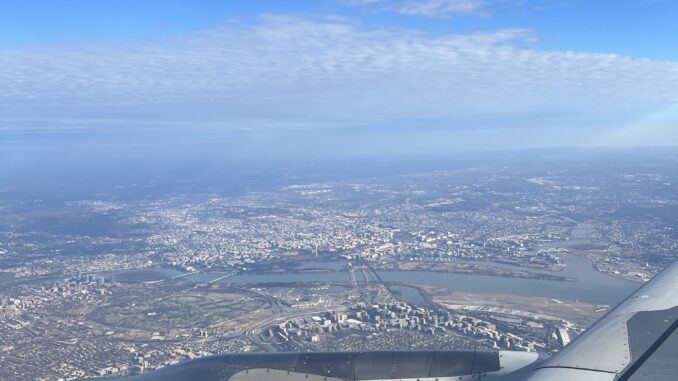

The perimeter rule isn’t about shooting three-pointers, as college basketball fans might first think.
Congress is tasked with reauthorizing provisions related to the Federal Aviation Administration (FAA) and the main fight is over the future of the popular Reagan National Airport just outside of Washington, D.C.
The perimeter rule is a federal regulation established in 1966 limiting non-stop service to/from Reagan National. By the mid-1980s, Congress had expanded non-stop service to 1,250 statute miles with some exceptions.
Cities with non-stop service exceeding the rule include: Austin; Denver, Colo.; Las Vegas; Los Angeles; Phoenix; Salt Lake City; San Francisco; San Juan; Seattle and Portland, Ore.
In an effort to keep Reagan as a “short haul” airport, the rule essentially designates Washington Dulles International Airport as the region’s “long haul” airport.
Reagan is, therefore, the only airport in the country that subject to federal restrictions on the number of daily flights allowed in and out.
After recent modernization that has led some in the industry to call it best airport in the nation, a group called the Capital Access Alliance was formed to support the elimination of the perimeter rule and allow more flights.
Lifting that rule would bring somewhere around 20-25 additional flights per day into Reagan. As air traffic in and out of the nation’s capital has increased ten-fold, according to a study, the Capital Access Alliance says opening the market to more competition would make air travel more affordable and efficient.
Opposition to changing the rules quickly sprung into action.
Led by American Airlines and United Airlines, a group called the Coalition to Protect America’s Regional Airports says the previous changes at Reagan have led to more noise, delays, congestion and reduction of service to smaller markets. The group also cites ongoing shortages in pilots and air traffic controllers, calling expansion for Reagan “not sustainable” and will cause more delays and disruptions.
However, a 2020 Government Accountability Office report found that a total of 39 daily unallocated slots were available for commercial airlines at Reagan National and a review of FAA data in 2019 found that, on average, fewer than one general aviation reservation was used each hour (or almost 13 per day).”
The regional airport coalition also counts three North Carolina-based supporters: the Charlotte Regional Business Alliance, Coastal Carolina Regional Airport based in New Bern, and the N.C. House Small Business Caucus.
American Airlines maintains hubs in both Charlotte and at Reagan National and daily flights at smaller airports. That gives them a powerful incentive to keep the status quo, supporters of bringing market forces to Reagan National argue.
“Modernizing the perimeter rule say the changes would lower ticket prices and make America’s capital more accessible for millions of air travelers around the country,” said Capital Access Alliance spokesman Brian Walsh in a statement. “It is costing consumers hundreds of millions per year in higher-than-average ticket prices and millions of hours in lost productivity because so many travelers have to take connecting flights to and from DCA.”
“The bipartisan DCA Act is a long overdue reform that simply gives air travelers more choices when they fly at more affordable costs,” Walsh continued.



